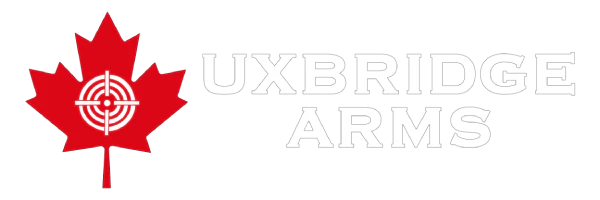Canadian Gun Law!
Share
Hey there, fellow hunters and firearms enthusiasts! Are you ready to embark on a thrilling adventure through the vast Canadian wilderness, armed with your trusty rifle or shotgun? Before you head out, let's explore the fascinating world of Canadian firearms laws and regulations. Don't worry, it's not as dry as it sounds—I'll make sure it's as engaging as your favourite hunting story!
Understanding Canadian Firearms Classes
Prohibited Firearms
Imagine a sign that says, "Danger: Do Not Enter." That's basically what prohibited firearms are in Canada. According to the RCMP, certain firearms are strictly off-limits, including fully automatic guns, short-barreled handguns, and some rifles and shotguns. These are considered too dangerous for public ownership. So, let’s skip these and focus on the options available to us!
Restricted Firearms
Restricted firearms include some handguns and semi-automatic guns. Owning one requires extra permits and safety courses. You’ll need to demonstrate a "legitimate reason" for owning one, like target shooting or collecting. This category requires you to show your skills and commitment to responsible firearm ownership. Think of it as a badge of honor for the experienced hunter!
Non-Restricted Firearms
Non-restricted firearms, like rifles and shotguns, are the easiest to obtain and perfect for hunting. You’ll still need a license, but no extra permits or safety courses are required. These are your bread-and-butter guns, ideal for bagging your next trophy in the great Canadian outdoors. Just imagine the thrill of spotting that elusive deer, knowing you’re fully equipped and legal to take the shot!
Buying Firearms in Canada
Thinking about buying a firearm? Here’s the scoop. You’ll need a valid firearms license (known as a Possession and Acquisition Licence, or PAL). The seller must ensure the firearm is legally transferred, which means checking your PAL and ensuring all paperwork is in order. It sounds tedious, but it’s all about ensuring safety and responsibility. Plus, once you’re through the process, you’ll have your new hunting companion ready for action.
Buying Ammunition in Canada
Buying ammunition follows similar rules to buying firearms. You’ll need a valid firearms license, and the seller must ensure the ammunition is legally transferred. It’s straightforward and ensures that only responsible individuals are purchasing ammunition. So, whether you’re stocking up for hunting season or a day at the range, just show your PAL and you’re good to go.
Recent Changes in Canadian Firearms Laws
Bill C-71 and Bill C-21: What You Need to Know
Canada has introduced a range of new gun laws in recent years, most notably through Bill C-71 and the proposed Bill C-21.
- Bill C-71, effective since June 21, 2019, requires PAL holders to get permission from the RCMP to buy, sell, or give away non-restricted firearms. It also mandates gun stores to record purchase details and restricts firearm licenses for individuals with violent histories.
- Bill C-21, aims to introduce stricter controls, including a freeze on the buying, selling, and transferring of handguns. If passed, it would make it illegal to acquire handguns, though current owners could keep theirs. The bill also proposes limiting rifle magazines to five rounds and revoking licenses from those involved in domestic violence or criminal harassment.
Assault-Style Weapons Ban
In May 2020, following the tragic mass shooting in Nova Scotia, the federal government banned assault-style weapons. This ban affects 1,500 varieties of firearms, making it illegal to buy, sell, import, transport, or use these weapons in Canada. If you own one of these firearms, you have until October 30, 2023, to comply with the Amnesty Order.
Practical Tips for Firearm Owners
Transporting and Storing Firearms
Can you carry a gun in public in Canada? Generally speaking, no. Restricted and prohibited firearms can only be carried by certain professionals or under special circumstances. Non-restricted rifles and shotguns can be carried for wilderness protection, primarily when hunting. Always remember to transport firearms unloaded and securely stored in your vehicle.
Shooting on Your Own Property
Can you shoot on your own property? This varies by region. Some rural areas may allow target practice, provided you’re a safe distance from major highways and residential areas. However, densely populated areas will have stricter regulations. Always check your local bylaws before setting up a backyard shooting range.
Gun Silencers and Storage
Gun silencers, also known as suppressors, are generally illegal in Canada, with few exceptions for those with grandfathered privileges. Proper storage of firearms is crucial; improper storage can lead to your license being revoked. Always ensure firearms are stored unloaded and locked away securely when not in use.
How Uxbridge Arms Can Help You
Navigating Canadian firearms laws can be a complex journey, but you don’t have to do it alone. Uxbridge Arms is here to guide you through every step of the process. Whether you’re looking to obtain your PAL, purchase your first hunting rifle, or need advice on the latest regulations, our experts are ready to assist.
At Uxbridge Arms, we believe in responsible gun ownership and safety. Our certified instructors offer comprehensive safety courses to ensure you’re well-prepared to handle your firearm. Plus, our knowledgeable staff can help you find the perfect match for your hunting or shooting needs.
Conclusion
Canada’s firearms laws are designed to promote public safety and responsible gun ownership. By understanding these regulations, you can enjoy your hunting trips while keeping yourself and others safe. Remember, firearms ownership comes with great responsibility. Let Uxbridge Arms guide you through the process and help you find the perfect firearm for your needs. Visit us today and let’s get hunting!
